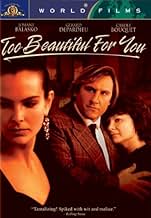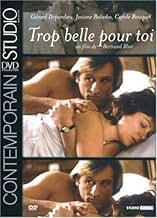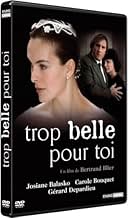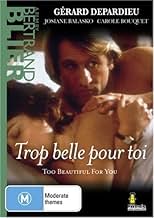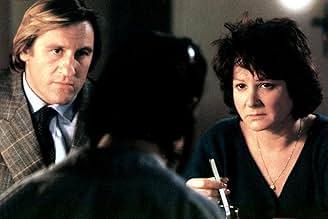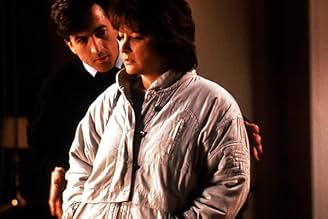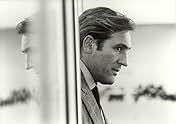Trop belle pour toi
- 1989
- Tous publics
- 1h 31m
IMDb RATING
6.6/10
3.2K
YOUR RATING
A sharp love triangle is formed by a wealthy businessman.A sharp love triangle is formed by a wealthy businessman.A sharp love triangle is formed by a wealthy businessman.
- Awards
- 6 wins & 7 nominations total
Gérard Depardieu
- Bernard Barthélémy
- (as Gerard Depardieu)
Catherine Gillet
- La femme du train
- (uncredited)
Sylvie Orcier
- Marie-Catherine
- (uncredited)
- Director
- Writer
- All cast & crew
- Production, box office & more at IMDbPro
Featured reviews
10Honkon
Very few directors are prepared to take the sort of liberties Blier does, both in terms of subject matter and the manner of telling the story. "Trop Belle Pour Toi" is perhaps his most accessible film, telling the story of a successful man with a beautiful wife who unaccountably falls in love with his dumpy secretary. Depardieu is wonderful in this, utterly bewildered by his predicament, and the noted comedienne Balasko is radiant as a woman in love.
The style is almost cubist, the celebrated "beginning middle and end but not necessarily in that order", and alternative storylines are proposed and discarded at whim, to the evident confusion of some viewers. Blier has often gone all out to shock but that's less evident here, however his audacious humour remains intact. Not one for the viewer who likes to sit back and be told a straight story but for the rest of us, a joy from start to finish.
The style is almost cubist, the celebrated "beginning middle and end but not necessarily in that order", and alternative storylines are proposed and discarded at whim, to the evident confusion of some viewers. Blier has often gone all out to shock but that's less evident here, however his audacious humour remains intact. Not one for the viewer who likes to sit back and be told a straight story but for the rest of us, a joy from start to finish.
Bertrand Blier is the French Pedro Almodovar: cynical and shocking. Either you love, either you hate his movies. Some of them have divided French public due to their shocking contents, notably "Les Valseuses" (1974). "Trop belle pour toi" appears like an exception in his work. It means that taste of Blier for provocation is less pronounced. However, it doesn't make the movie better for all that. It doesn't work for several reasons:
first, it's hard to follow the plot because Blier introduces sequences that are earlier or subsequent to the present scene. For example, we realize too late that Colette ( Balasko) after she left Bernard, married with a man and she had children. The movie ignores certain sequences that are however essential to the development of the plot.
Then, the movie irritates due to its main characters, it goes without saying that dialogs are the key to the good development of the plot. But here, you are under the impression that the characters don't exchange their words. They're talking in the emptiness and don't seem to care about the others' opinion!
Let's add that the movie, sometimes, creates a certain boredom because of some lifeless sequences that drag on (notably during dinners in Depardieu's ravishing house with his wife ( Bouquet) and all their guests.
In short, "trop belle pour toi" is a cold and no soul movie and it left me unsatisfied in spite of good ideas in the making ( Cluzet who expresses his anger with Schubert's music in the background played very loud). Even a trio of outstanding actors don't succeed in saving the movie.
Remark: Carole Bouquet won an Oscar in France in 1990, for her performance in this movie. Good for her.
first, it's hard to follow the plot because Blier introduces sequences that are earlier or subsequent to the present scene. For example, we realize too late that Colette ( Balasko) after she left Bernard, married with a man and she had children. The movie ignores certain sequences that are however essential to the development of the plot.
Then, the movie irritates due to its main characters, it goes without saying that dialogs are the key to the good development of the plot. But here, you are under the impression that the characters don't exchange their words. They're talking in the emptiness and don't seem to care about the others' opinion!
Let's add that the movie, sometimes, creates a certain boredom because of some lifeless sequences that drag on (notably during dinners in Depardieu's ravishing house with his wife ( Bouquet) and all their guests.
In short, "trop belle pour toi" is a cold and no soul movie and it left me unsatisfied in spite of good ideas in the making ( Cluzet who expresses his anger with Schubert's music in the background played very loud). Even a trio of outstanding actors don't succeed in saving the movie.
Remark: Carole Bouquet won an Oscar in France in 1990, for her performance in this movie. Good for her.
I saw "Trop Belle Pour Toi" when it was released on the art-house theatrical circuit in the U.S. 30 years ago. This film has stuck with me since that time and still feels very true to life as our culture has become even more superficial than it was in the "go-go" '80s--particularly when it comes to definitions of beauty. The plot is simple: A rough-edged, ambitious, striving man (Gerard Depardieu at the height of his international fame) has achieved great success in the auto business, and he's acquired all the "trophies" that he may have desired: the cars, the house, the lifestyle, the almost too-gorgeous, elegant, younger wife. But he develops a visceral attraction to his secretary, who is dumpy, older, physically ordinary. They begin an affair, and he finds his lover warm, comforting, engaging and sexually exciting in ways that his very beautiful wife (crisply played by Carole Bouquet) is not.
What stuck with me about this film for 30 years is the deft way the director upends the classic interpretations of what makes someone "attractive," desirable or sexy, and what makes for a really exciting sexual and romantic relationship. The film hits some very true-to-real-life notes about what drives people in their most basic appetites and desires. Depardieu gives an engaging, visceral performance as a man having a classic midlife crisis: he's bored by his marriage to the perfect woman that everyone else envies, even though she's perfectly nice and intelligent. Every time I read or hear people saying that some famous man must be crazy for cheating on his beautiful wife or that he must be blissfully happy because his wife is a famous beauty, I automatically think of this film. I plan to watch it again soon.
What stuck with me about this film for 30 years is the deft way the director upends the classic interpretations of what makes someone "attractive," desirable or sexy, and what makes for a really exciting sexual and romantic relationship. The film hits some very true-to-real-life notes about what drives people in their most basic appetites and desires. Depardieu gives an engaging, visceral performance as a man having a classic midlife crisis: he's bored by his marriage to the perfect woman that everyone else envies, even though she's perfectly nice and intelligent. Every time I read or hear people saying that some famous man must be crazy for cheating on his beautiful wife or that he must be blissfully happy because his wife is a famous beauty, I automatically think of this film. I plan to watch it again soon.
6=G=
"To Beautiful For You" tells of a French car dealer (Depardieu) who is married to a beautiful women (Boquet) but falls in lust with his less than beautiful temp (Balasko). What follows is an affair and much discourse about same between husband and wife, wife and temp, temp and husband, and all permutations thereof as they ponder the meaning of love. The film is not for want of a good cast or production talent and earned respectable marks from critics and public alike. However, is suffers from obvious histrionics and didactics and an off-puting uneven flow which make for a less than immersing experience. TBFY has little nudity or sex but some very explicit language. Only for those into esoteric French films. (B)
"Elle est trop belle" is a romantic drama overflowing with a refined yet vulgar sensuality that is common in French films. Sexuality, lust, infidelity are the main themes of the film, and are lusciously exhibited on screen. Choice of music was excellent, with Schubert in the background providing beauty and consolation in midst of heightened drama. You have fancy dinners, spacious mansions and country homes. Certainly men of culture will appreciate this film.
Acting in scenes was mostly naturalistic and plain, though not completely without emotion. Overall tempo of the movie was slow and relaxed, taking plenty of time to establish scenes and characters. Sometimes even bordering on boredom. Focus was not purely based on intense emotions of infatuation and cliched notions of romanticism, but the human relationships between the characters.
The unoriginality of the subject matter and the lack of subversiveness in the message, however, dims the glow of its achievements. The sudden middle-life crisis and the marital unhappiness of a well-to-do middle class couple has been well documented in the history of film, and there have been better portrayals of it. The movie is heavy-handed with its message of internal and external beauty.
There might have been some critique of the boredom of the perfect bourgeoisie life, but it is soo brief, indirect and inconsequential you could easily miss it. It seems the down-to-earth nature and vividness of Colette is contrasted with the icy and cold demeanor of the proper Florence, and the white spacious family home with the small run-down motel.
In the end, the story felt quite simple and predictable, even cliched. While watching it for the first time was a pleasant experience, there is probably little one can gain from rewatching the film. Overall, it is a decent film, doing its job well, but nothing out of the ordinary. Though I do admire the movie in other respects, the script just doesn't make it.
Acting in scenes was mostly naturalistic and plain, though not completely without emotion. Overall tempo of the movie was slow and relaxed, taking plenty of time to establish scenes and characters. Sometimes even bordering on boredom. Focus was not purely based on intense emotions of infatuation and cliched notions of romanticism, but the human relationships between the characters.
The unoriginality of the subject matter and the lack of subversiveness in the message, however, dims the glow of its achievements. The sudden middle-life crisis and the marital unhappiness of a well-to-do middle class couple has been well documented in the history of film, and there have been better portrayals of it. The movie is heavy-handed with its message of internal and external beauty.
There might have been some critique of the boredom of the perfect bourgeoisie life, but it is soo brief, indirect and inconsequential you could easily miss it. It seems the down-to-earth nature and vividness of Colette is contrasted with the icy and cold demeanor of the proper Florence, and the white spacious family home with the small run-down motel.
In the end, the story felt quite simple and predictable, even cliched. While watching it for the first time was a pleasant experience, there is probably little one can gain from rewatching the film. Overall, it is a decent film, doing its job well, but nothing out of the ordinary. Though I do admire the movie in other respects, the script just doesn't make it.
Did you know
- TriviaIn the documentary Blier, Leconte, Tavernier: trois vies de cinéma (2020), Blier says it was hell to shoot.
- Quotes
Colette Chevassu: Beauty hurts.
- SoundtracksImpromptu Opus 90 No 2
Music by Franz Schubert
Piano: Odette Gartenlaub
édition CINE VALSE - D.D. PRODUCTIONS - ORLY FILMS -S.E.D.I.F.
- How long is Too Beautiful for You?Powered by Alexa
Details
Box office
- Gross US & Canada
- $1,776,440
- Opening weekend US & Canada
- $31,208
- Mar 4, 1990
- Gross worldwide
- $1,776,440
- Runtime
- 1h 31m(91 min)
- Sound mix
- Aspect ratio
- 2.35 : 1
Contribute to this page
Suggest an edit or add missing content

